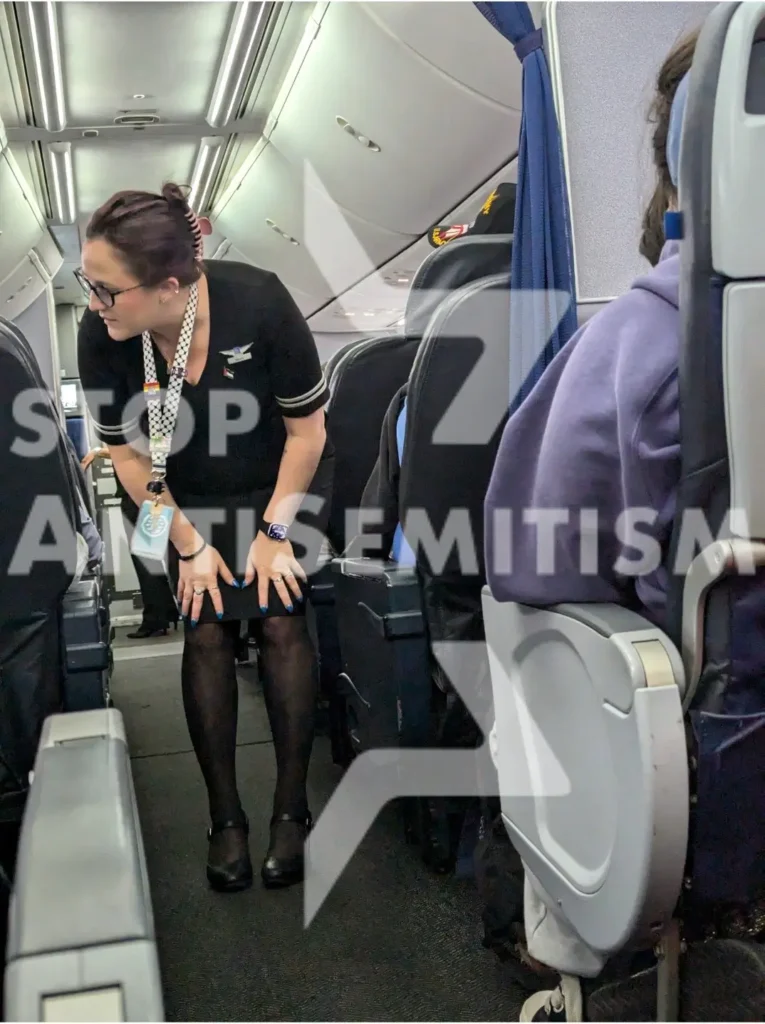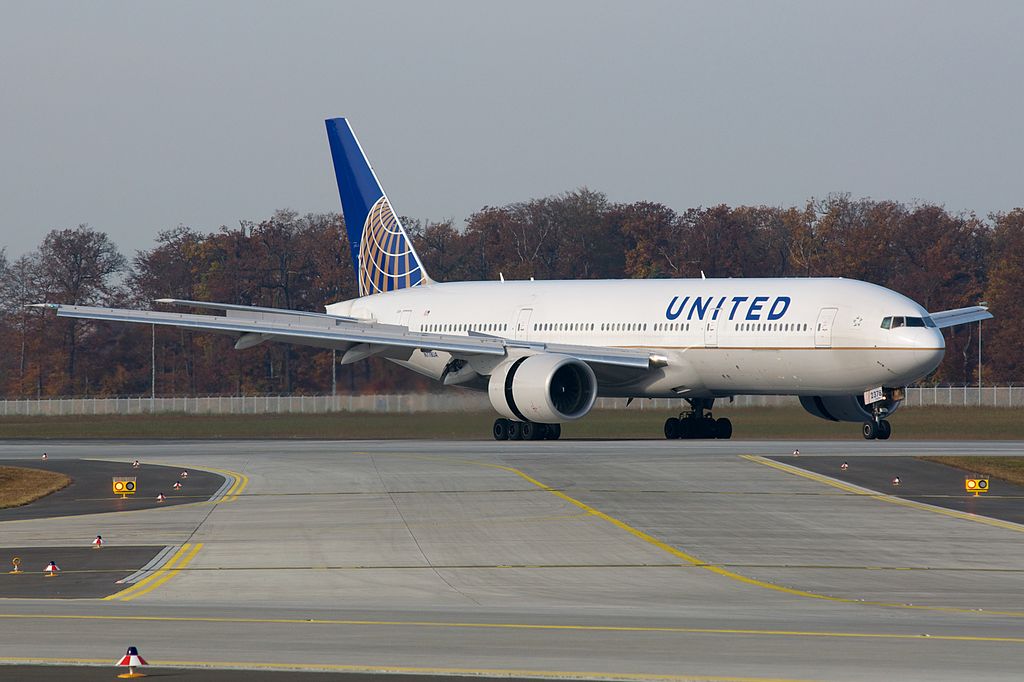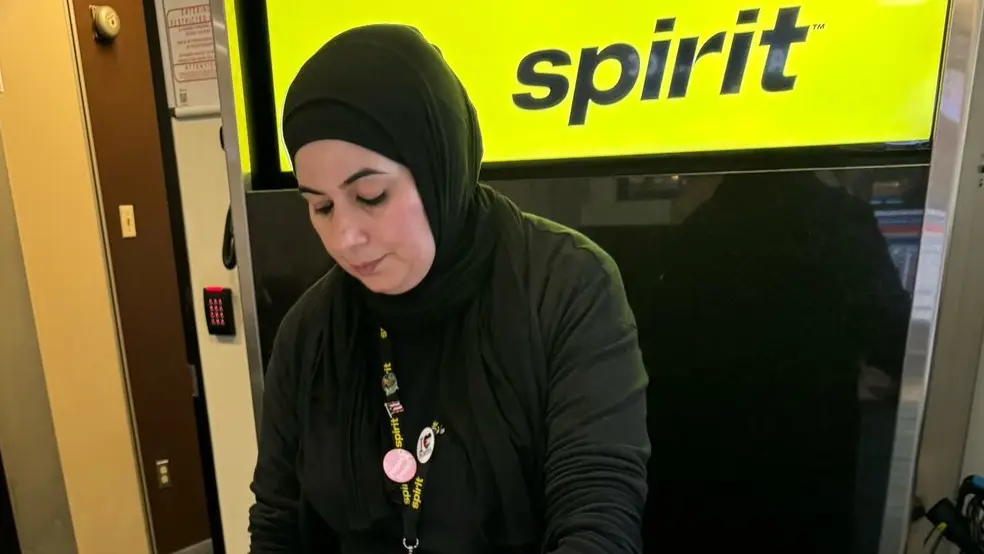United Airlines’ Stance on Pride Pins: The Palestinian Flag Controversy
United Airlines recently found itself at the center of a heated debate when one of its flight attendants was seen wearing a Palestinian flag pin on a domestic flight. The incident, which took place on a flight from Chicago’s O’Hare Airport to Newark Airport, sparked outrage among pro-Israel advocates, particularly the Jewish civil rights group StopAntisemitism. Despite the backlash, United Airlines has stood firm on its uniform policy, which allows flight attendants to display flag pins that reflect their personal pride and cultural heritage.
A Divisive Symbol or Personal Pride?
The controversy began when a passenger on the flight noticed the flight attendant wearing a Palestinian flag pin along with a keffiyeh, a traditional Palestinian scarf, and reported it to StopAntisemitism. The group quickly voiced its concern, arguing that such symbols have no place in what should be a neutral space, especially given the current geopolitical tensions surrounding the Israeli-Palestinian conflict.

Liora Rez, the founder of StopAntisemitism, expressed alarm at what she described as a “rising trend” of U.S. airline employees displaying Palestinian symbols while on duty. She emphasized that airlines should avoid allowing staff to make political statements while in uniform, stating, “Political stances belong off the clock. Airlines must ensure that passengers aren’t confronted with divisive symbols in what should be a neutral space.”
United Airlines’ Policy and Response
Despite the criticism, United Airlines defended its decision to allow the display of the Palestinian flag pin. The airline clarified that its uniform policy permits flight attendants to wear flag pins that either represent their language skills or a place to which they feel a special connection. According to United, this policy is designed to help passengers identify crew members who can communicate in their preferred language, as well as to allow staff to express pride in their cultural heritage.

In a statement, United Airlines reiterated its commitment to this policy: “Our uniform policy has long included an option for flight attendants to wear flag pins to designate specific language skills so that our customers who are more comfortable in a language other than English can know who on our crew speaks their preferred language. We also allow flight attendants to wear flag pins that represent their pride in a place to which they may have a special connection.”
The Broader Debate on Symbolism in Uniforms
The issue of symbolic pins on airline uniforms is not new. Back in 2020, many airlines, including United, allowed flight attendants to wear “Black Lives Matter” pins in response to the widespread protests against racial injustice in the United States. This decision, too, was met with a mixed response, with some passengers and employees voicing support, while others, particularly those with connections to law enforcement, felt uncomfortable or alienated.
Similarly, other airlines have faced scrutiny over their uniform policies. Spirit Airlines and Delta Air Lines, for example, have also been criticized by StopAntisemitism for allowing staff to wear Palestinian flag pins. Delta eventually modified its policy, announcing that as of July 15, flight attendants would only be permitted to wear U.S. flag pins on their uniforms. This decision was likely made in an effort to avoid further controversy and maintain a neutral stance.
Navigating a Complex Landscape
The debate over United Airlines’ uniform policy highlights the challenges that companies face in navigating complex social and political landscapes. On one hand, allowing employees to express their cultural pride can be seen as a celebration of diversity and inclusivity, values that many companies, including United, strive to uphold. On the other hand, the display of certain symbols can be perceived as divisive, particularly in a setting where passengers from diverse backgrounds may have differing views on sensitive issues.
As the airline industry continues to grapple with these issues, it is clear that there is no one-size-fits-all solution. Airlines must carefully consider the implications of their uniform policies, balancing the rights of their employees to express themselves with the need to create a comfortable and neutral environment for all passengers.

@iliketeslas/X
Conclusion One:
United Airlines’ decision to allow the display of the Palestinian flag pin has sparked a significant debate, reflecting broader societal tensions and the challenges of maintaining neutrality in a highly polarized world. As the conversation continues, it remains to be seen how airlines will adapt their policies to address the concerns of both their employees and passengers, while striving to uphold their commitment to diversity and inclusion.
This incident serves as a reminder that symbols, while small in size, can carry significant meaning, and their display can have far-reaching implications in today’s interconnected and often contentious world. Whether for language skills or cultural pride, the pins worn by airline staff have become more than just accessories—they are now at the heart of a larger conversation about identity, politics, and the role of businesses in shaping public discourse.

X / @StopAntisemites
Could United Airlines Change Its Policy on Flag Pins? A Closer Look at the Possibilities
The recent controversy surrounding a United Airlines flight attendant wearing a Palestinian flag pin has ignited a broader discussion about the airline’s uniform policies. While United has defended its current stance, the question remains: could the company be pressured into changing its policy in response to growing concerns and criticism?
The Current Policy: A Balancing Act
United Airlines’ existing policy allows flight attendants to wear flag pins representing their language skills or places with which they have a special connection. This policy is rooted in the airline’s commitment to diversity and inclusion, allowing employees to express pride in their cultural heritage while also providing a practical function—helping passengers identify crew members who can communicate in their preferred language.
However, as the recent incident has shown, these symbols can also be perceived as political statements, which some passengers and advocacy groups find divisive. The challenge for United is to balance the expression of personal pride with the need to maintain a neutral, comfortable environment for all passengers.
Pressure from Advocacy Groups
Advocacy groups like StopAntisemitism have already begun to pressure United Airlines to revise its uniform policy. These groups argue that political symbols, particularly those linked to contentious issues like the Israeli-Palestinian conflict, have no place in a professional setting, especially one that serves a diverse customer base. The argument is that such symbols could alienate or upset passengers, leading to a less inclusive environment overall.
The precedent set by other airlines, such as Delta Air Lines, which restricted flag pins to U.S. flags only, shows that policy changes are possible under sustained pressure. Delta’s decision to limit flag pins was likely a response to similar concerns about neutrality and the desire to avoid controversy.
United Airlines’ Response: Will They Budge?
So far, United Airlines has stood by its policy, emphasizing the importance of allowing flight attendants to express their cultural identity. The airline’s leadership seems committed to its principles of diversity and inclusion, even in the face of criticism. This suggests that any potential policy change would not be taken lightly.
However, if the controversy continues to grow or if there is a significant backlash from passengers, United might be forced to reconsider its stance. A shift in policy could occur if the airline perceives that the controversy is affecting its reputation, customer satisfaction, or overall brand image.
The Role of Public Opinion and Business Interests
Public opinion plays a crucial role in shaping corporate policies, especially for companies like United Airlines that operate in a highly competitive industry where customer perception is key. If a significant portion of the flying public voices concerns or if there is a coordinated campaign by advocacy groups, United may find itself compelled to revisit its uniform policy.
Moreover, business interests might also drive a change. If the airline’s leadership believes that the controversy is damaging their relationship with certain customer demographics or if it leads to a loss in business, they may opt for a more conservative approach, similar to Delta’s U.S.-flag-only policy.
Conclusion Two : A Possible Policy Change?
While United Airlines has shown resilience in maintaining its current policy, the possibility of a policy change cannot be entirely ruled out. The airline will likely continue to monitor the situation closely, weighing the values of diversity and inclusion against the practical considerations of maintaining a neutral, welcoming environment for all passengers.
Ultimately, any decision to change the policy would depend on factors, including public reaction, pressure from advocacy groups, and the potential impact on the airline’s business. For now, United Airlines seems committed to its stance, but as the situation evolves, so too might its policies.
If you Liked Reading our blog, Read More Blogs Here
UseFull Resources:
| Resources | Resources |
|---|---|
| Tooldar: Tooldar | Hemingway Editor: Hemingway Editor |
| Ilovepdf3: Ilovepdf3 | Grammarly: Grammarly |
| Adorepdf: Adorepdf | Coursera: Coursera |
| Custom Design Agency: Articon Design Agency | Udemy: Udemy |
| Google: Google | Khan Academy: Khan Academy |
| Yandex: Yandex | Wolfram Alpha: Wolfram Alpha |
| Baidu: Baidu | TED Talks: TED Talks |
| Medium: Medium | Skillshare: Skillshare |
| Quora: Quora | Canva: Canva |
| Duolingo: Duolingo | Figma: Figma |
| Nerdfitness: Nerdfitness | Trello: Trello |
| DeepL: DeepL | Notion: Notion |
| LinkedIn: LinkedIn | Asana: Asana |
| Stack Overflow: Stack Overflow | Mailchimp: Mailchimp |
| GitHub: GitHub | Zapier: Zapier |
Note : These Above Resources Are just for Educational and ease of use Purposes we neither Endorse them, they were working at the time of sharing.











